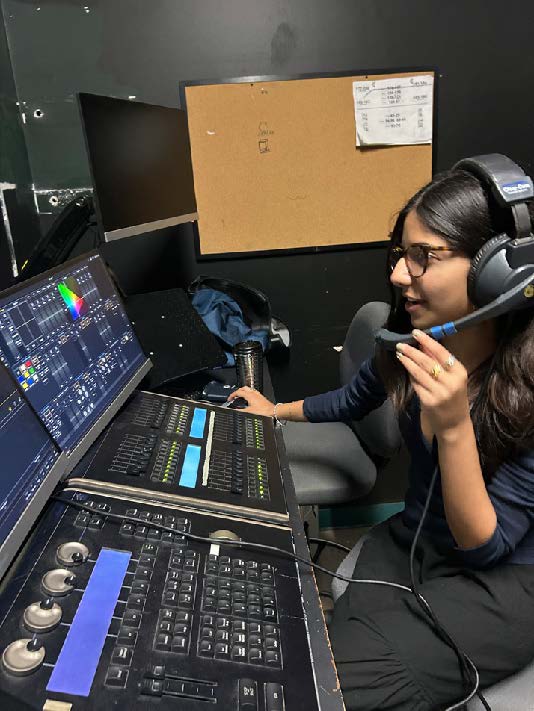Behind every seamless live performance is a master of organized chaos. Meet the stage manager — the quiet conductor who embodies the phrase “the show must go on.”
The stage manager is the organizational backbone of any theatrical production, coordinating between directors, actors, and technical crews to ensure every element runs smoothly during a show. From five-hour tech rehearsals and multiple live performances, they oversee everything from lighting cues to prop placements.
“I trust that the stage manager will be organized and have time management skills to make everything run smoothly. I also expect the stage manager to anticipate issues that my come up and challenges that have been hanging in the bounds during rehearsals.” said Ransom Everglades arts director Ms. Laura Montes.
The role demands effective communication, problem-solving skills, and a calm demeanor under pressure. “It’s pretty hectic and consumes a lot of time,” explained former Ransom Everglades stage manager Nina Tekriwal ’25. Tekriwal worked as stage manager for RE’s productions of “Cinderella,” “The Curious Incident of the Dog in the Nighttime,” “A Christmas Carol: A Ghost Story,” and TEDxRansomEvergladesSchool.
The job of a stage manager consists of communicating with every department working the show, including lights, sound, and backstage crew. Stage managers must be aware of every technical aspect of the production.
More specifically, stage managers write down each light and sound cue into their script. Depending on the show, this could take days. During the actual performance, the stage manager follows the show through the script and communicates the cues to the different technical departments so they know when to do their action.
The most recent production, “Lord of the Choir,” was overseen by stage manager Lina Febres ’26. Reflecting on the experience, Febres shared, “There were a lot of sound effects involved in the production. Finding the perfect time and place for each sound effect was very unique to the show especially because it was a comedy.”
Based on the genre of the show, stage managers have to adapt to the stylistic choices given by the director. For instance, a comedy is bound to have laugh breaks, so stage managers need to track when it’s the best time to call a cue. However, a drama requires enough time to let the audience soak in what they witnessed, meaning timing has to be perfect in order to keep the audience engaged.
With school assignments, extra-curriculars, and college applications, stage managers have to learn to balance the job with the obligations of being a student. As a director, Montes believes that “time management is extremely important for a stage manager, and just having a sense of multitasking is very important. Being able to handle multiple situations at a time.”
Tekriwal balances a day during tech week by “going in and filling cues out on my script. And then, 3-4 hours after school doing the actual rehearsals. And then I go home and then I eat. Do homework. And then I sleep.” The average RE tech rehearsal lasts over five hours and spans over two school weeks. This adds up to over 25 hours of work, not including the personal work required on weekends. This also does not include the hours from the show days.
The length of tech week rehearsals can sometimes incite tension between the stage manager and the actors.
“When tech week comes along, everything is all about the stage manager. Actors are very passionate, so stage managers should think about that as well and try not to get mad,” recalled actor Gaby Barreto ’27.
“Stage managers had a really bad name, and they were scary, and they weren’t seen as people,” Tekriwal commented. “Honestly, it’s just a matter of if I have to say something, I will say it, and that is respected just because of the role of stage manager. And people know that you listen to the stage manager to get things done and for the show to run smoothly,” she added.
One source of tension is the immense pressure put on stage managers by directors, actors, and the crew in the short span of tech week. In “Lord of the Choir,” Febres explained, “We were very short on time because of hurricanes Helene and Milton. School was canceled so we lost a lot of rehearsal time. To ensure the show’s success, we had to work extremely hard, and that meant giving a lot of directions.”
Barreto’s tip for stage managers? “Even if you are the stage manager, you have to listen to ideas from other people.” For her part, Tekriwal’s goal is to try and “create a community vibe to be compassionate and personable.”
“Even through the stress, we came together as a cast and crew to make the show a success,” Febres reflected.







